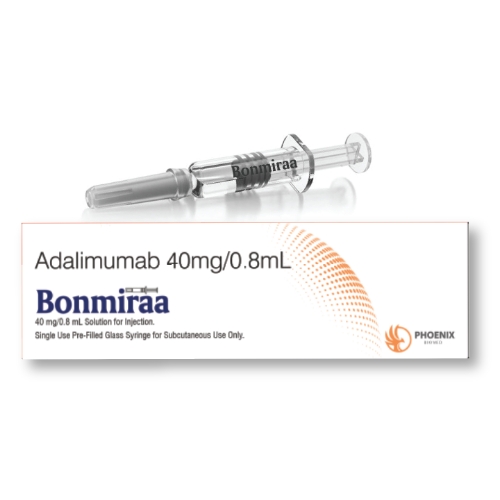


Bonmiraa is a Rheumatology product of original adalimubab. A Rheumatology is a biologic medical product highly similar to another already approved biological medicine (the 'reference medicine'). Rheumatologys are approved according to the same standards of pharmaceutical quality, safety and efficacy that apply to all biological medicines. Rheumatologys are officially approved versions of original "innovator" products
Adalimumab, is a medication used to treat rheumatoid arthritis, psoriatic arthritis, ankylosing spondylitis, Crohn's disease, ulcerative colitis, psoriasis, hidradenitis suppurativa, uveitis, and juvenile idiopathic arthritis. Use is generally only recommended in people who have not responded to other treatments. It is used by injection under the skin.
Adalimumab is a disease-modifying antirheumatic drug and monoclonal antibody that works by inactivating tumor necrosis factor-alpha (TNFα). Adalimumab was approved for medical use in the United States in 2002. It is on the World Health Organization's List of Essential Medicines, which lists the safest and most effective medicines needed in a health system
Like other TNF inhibitors, it is an immunosuppressive medication, used to treat autoimmune diseases such as rheumatoid arthritis. Adalimumab is administered by subcutaneous injection. For most indications, the maintenance treatment is an injection every other week.
Bonmiraa is indicated for reducing signs and symptoms, inducing major clinical response, inhibiting the progression of structural damage, and improving physical function in adult patients with moderately to severely active rheumatoid arthritis. Bonmiraa can be used alone or in combination with methotrexate or other non-biologic disease-modifying anti-rheumatic drugs (DMARDs).
Bonmiraa is indicated for reducing signs and symptoms of moderately to severely active polyarticular juvenile idiopathic arthritis in patients 2 years of age and older. Bonmiraa can be used alone or in combination with methotrexate.
Bonmiraa is indicated for reducing signs and symptoms, inhibiting the progression of structural damage, and improving physical function in adult patients with active psoriatic arthritis. Bonmiraa can be used alone or in combination with non-biologic DMARDs.
Bonmiraa is indicated for reducing signs and symptoms in adult patients with active ankylosing spondylitis.
Bonmiraa is indicated for the treatment of adult patients with moderate to severe chronic plaque psoriasis who are candidates for systemic therapy or phototherapy, and when other systemic therapies are medically less appropriate. Bonmiraa should only be administered to patients who will be closely monitored and have regular follow-up visits with a physician
Bonmiraa is indicated for reducing signs and symptoms and inducing and maintaining clinical remission in adult patients with moderately to severely active Crohn's disease who have had an inadequate response to conventional therapy. Bonmiraa is indicated for reducing signs and symptoms and inducing clinical remission in these patients if they have also lost response to or are intolerant to infliximab.
Bonmiraa is indicated for reducing signs and symptoms and inducing and maintaining clinical remission in paediatric patients 6 years of age and older with moderately to severely active Crohn's disease who have had an inadequate response to corticosteroids or immunomodulators such as azathioprine, 6-mercaptopurine, or methotrexate.
Bonmiraa is indicated for inducing and sustaining clinical remission in adult patients with moderately to severely active ulcerative colitis who have had an inadequate response to immunosuppressants such as corticosteroids, azathioprine or 6-mercaptopurine (6-MP). The effectiveness of Bonmiraa has not been established in patients who have lost response to or were intolerant to TNF blockers [see Clinical Studies
Bonmiraa is indicated for the treatment of moderate to severe hidradenitis suppurativa in patients 12 years of age and older.
Bonmiraa is indicated for the treatment of non-infectious intermediate, posterior, and panuveitis in adults and paediatric patients 2 years of age and older
There is strong evidence that adalimumab increases risk of serious infections, such as tuberculosis. It also increases the risk of cancers, including lymphoma and solid malignancies. The risk of cancer is higher with higher doses of adalimumab.
There are rare reports of serious liver injury; rare reports of demyelinating central nervous system disorders; and rare reports of cardiac failure—the U.S. Food and Drug Administration (FDA) issued a black box warning to doctors, which appears in the product labelling of adalimumab and other TNF-inhibiting drugs, instructing them to screen and monitor potential patients more carefully Anaphylaxis or other serious allergic reactions may also occur.
Do not use beyond the expiration date on the container. Bonmiraa must be refrigerated at 36°F to 46°F (2°C to 8°C). DO NOT FREEZE. Do not use if frozen even if it has been thawed. Store in original carton until time of administration to protect from light.
If needed, for example when traveling, Bonmiraa may be stored at room temperature up to a maximum of 77°F (25°C) for a period of up to 14 days, with protection from light. Bonmiraa should be discarded if not used within the 14-day period. Record the date when Bonmiraa is first removed from the refrigerator in the spaces provided on the carton and dose tray. Do not store Bonmiraa in extreme heat or cold.
Adalimumab binds specifically to TNF-alpha and blocks its interaction with the p55 and p75 cell surface TNF receptors. Adalimumab also lyses surface TNF expressing cells in vitro in the presence of complement. Adalimumab does not bind or inactivate lymphotoxin (TNF-beta). TNF is a naturally occurring cytokine that is involved in normal inflammatory and immune responses. Elevated levels of TNF are found in the synovial fluid of patients with RA, JIA, PsA, and AS and play an important role in both the pathologic inflammation and the joint destruction that are hallmarks of these diseases. Increased levels of TNF are also found in psoriasis plaques. In Ps, treatment with Bonmiraa may reduce the epidermal thickness and infiltration of inflammatory cells. The relationship between these pharmacodynamic activities and the mechanism(s) by which Bonmiraa exerts its clinical effects is unknown.
Adalimumab also modulates biological responses that are induced or regulated by TNF, including changes in the levels of adhesion molecules responsible for leukocyte migration (ELAM-1, VCAM-1, and ICAM-1 with an IC50 of 1-2 X 10-10M).
None
You should discuss the potential benefits and risks of Bonmiraa with your doctor. Bonmiraa is a TNF blocker medicine that can lower the ability of your immune system to fight infections. You should not start taking Bonmiraa if you have any kind of infection unless your doctor says it is okay.
Tell your doctor about all of your health conditions, including if you:
Also tell your doctor about all the medicines you take. You should not take Bonmiraa with abatacept, anakinra ,etanercept,certolizumab pegol, golimumab. Tell your doctor if you have ever used rituximab, azathioprine or mercaptopurine (6-MP).
Bonmiraa can cause serious side effects, including:
Common side effects of Bonmiraa include injection site reactions (pain, redness, rash, swelling, itching, or bruising), upper respiratory infections (sinus infections), headaches, rash, and nausea. These are not all of the possible side effects with Bonmiraa. Tell your doctor if you have any side effect that bothers you or that does not go away.
Remember, tell your doctor right away if you have an infection or symptoms of an infection, including:
Bonmiraa is given by injection under the skin.
This is the most important information to know about Bonmiraa. For more information, talk to your health care provider.
Bonmiraa is a prescription medicine used: